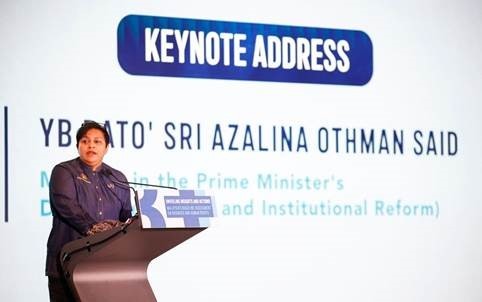
KUALA LUMPUR (Oct 26): The National Business and Human Rights Action Plan 2025-2030 (NBHRAP) is set to be completed by 2024, with a steering committee to be chaired by Datuk Seri Azalina Othman Said, Minister in the Prime Minister’s Department (Law and Institutional Reform).
“I will be chairing a steering committee with multi-stakeholders to delve into the intricate details of the national baseline assessment, finalising the report for its upcoming launch sometime in December 2023,” said Azalina during the “Unveiling Insights and Actions: Malaysia’s Baseline Assessment on Business and Human Rights” conference on Wednesday.
The NBHRAP was initiated to assess the legal and policy gaps in the United Nations Guiding Principles on Business and Human Rights (UNGPs) implementation in Malaysia, document any adverse human rights impacts by businesses, and identify the most salient business and human rights issues in the country today.
The UNGPs are seen as the authoritative set of guidelines for states and businesses to prevent, address and remedy any adverse impacts of business activities on human rights.
The conference was organised by the Legal Affairs Division of the Prime Minister’s Department, the United Nations Development Programme, Suhakam and the delegation of the European Union to Malaysia.
“This conference is especially important and timely as it showcases the preliminary findings of the NBABHR for Malaysia, which is key in developing an action plan for human rights and businesses,” said Azalina.
This is a whole range of human rights issues, such as gender discrimination, exploitation of migrant workers, forced labour, child labour and infringement of indigenous peoples’ rights.
The Human Rights Commission of Malaysia (Suhakam) has received 54 complaints involving issues of forced labour from 2020 to September 2023, said Datuk Mariati Robert, vice chair of Suhakam. This includes complaints on poor working conditions, withholding of wages and unclear working contracts.
The national baseline assessment scrutinises the present state of business and human rights in Malaysia, which covers four critical domains. These are governance, labour, environment and an additional chapter on cross cutting issues, such as child rights.
“Voluntary approaches to business and human rights are no longer sufficient to achieve long lasting results. Mandatory human rights due diligence is now central to the promotion of responsible business conduct that respects human rights,” said Dr Pichamon Yeophantong, member of the United Nations working group on business and human rights.
She also added the national action plan needs to be a living document that is reviewed and updated periodically to achieve cumulated progress.
“Publishing the national action plan is really just the beginning. By the same token, there is a need to build continually on existing good practices and address the issue of policy coherence and governance gaps in ways that are sensitive to changing political, economic and social dynamics both at home and abroad,” said Pichamon.
Source: https://theedgemalaysia.com/node/687727

